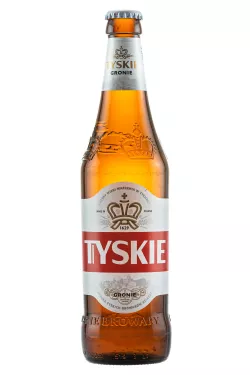Tyskie
Die polnische Brauerei Tyskie zählt zu den ältesten Braustätten Europas und blickt auf eine ereignisreiche Geschichte zurück. Im Laufe der Jahre hat das Unternehmen Hochs, Tiefs, Fortschritte und Rückschläge, Modernisierungen, Besitzerwechsel und Krieg erlebt — und überlebt. Bis heute kann man das feine Bier aus dem Hause Tyskie genießen.
Adlige Vergangenheit
Alles Begann am Anfang des 17. Jahrhunderts. In der Region rund um Pszczyna wurde gerne Bier getrunken und der Bierverkauf florierte. Die Brauerei Tyskie eröffnete 1629 ihre Pforten und erhielt die Erlaubnis, jede Woche Bier zu brauen. An der Spitze des jungen Unternehmens stand die Familie von Promitz. Nachdem der sächsische Uradel kein gutes Händchen bewies und der Braubetrieb kurz vor der Schließung stand, wechselte die Brauerei erstmals den Besitzer. Ein anderes Adelsgeschlecht versuchte sein Glück: Das Fürstentum von Pless (im tschechischen Pszczyna) sandte einen Sohn aus, um die Geschicke der Brauerei zukünftig zu lenken. Der Prinz war ein Visionär mit Unternehmergeist und großen Plänen. Er führte die erste Modernisierung durch und sorgte mit Elektrik und Eisenbahnschienen dafür, dass die Brauerei auf dem neusten Stand der Technik war. Seine größte Errungenschaft sollte allerdings die Einstellung eines bis dahin unbekannten Braumeisters sein. Julius Müller war ein Fachmann, der seine Erfahrung in den Brauereien Europas gesammelt hatte. Er bescherte der Brauerei das Rezept für ein goldenes Lager, das sich durch seine Ausgewogenheit und Süffigkeit von anderen Exemplaren der Zeit abhob. Dieser Sud verhalf Tyskie zum Durchbruch. Im ganzen Land wollte man das köstliche Lager trinken und bald schon gab es Nachfrage aus anderen europäischen Ländern.
Glück im Unglück
Das Bier der Brauerei wurde von Anfang an mit innovativer Technik hergestellt. Malztrockner, Eismaschinen, Aufzüge für den Fässertransport, automatische Flaschenabfüllung — Alles, was es zum jeweiligen Zeitpunkt gab, fand man bei Tyskie. Dank ihres Repertoires an technischen Hilfsmitteln war das Unternehmen am Ende des 19. Jahrhunderts die größte Brauerei Europas. Der Erste Weltkrieg zog an ihr vorüber, der Zweite war verhängnisvoller. Tyskie fiel in die Hände der Deutschen und wurde kurzerhand zur Produktionsstätte für Wehrmachtsbier umfunktioniert. Als die Armee abzog, sollte das gesamte Gelände gesprengt werden. Die Soldaten legten Minen, detonierten sie jedoch in der Eile des Rückzugs nicht. Mit vereinten Kräften konnte die Belegschaft die Brauerei retten und den Braubetrieb wieder aufnehmen. Heute ist Tyskie fester Bestandteil der internationalen Bierlandschaft und setzte den Erfolg aus der Vergangenheit fort. Das gute Lager aus der Feder Julius Müllers wird noch immer verkauft und ist unter dem Namen Tyskie Gronie Premium Lager weltbekannt.



